Network (1976)
Directed by: Sidney Lumet
Written by: Paddy Chayefsky
Starring: Faye Dunaway, Peter Finch, Robert Duvall, William Holden
USA
ON BLU-RAY: Now, from ARROW ACADEMY
RUNNING TIME: 121 min
REVIEWED BY: Dr Lenera, Official HCF Critic
Howard Beale, the long time anchor of the Union Broadcasting System’s UBS Evening News, learns from the news division president, Max Schumacher, that he has just two more weeks on the air because of slipping ratings. Big changes are expected now that, to Max’s annoyance, a faceless corporation has bought a controlling stake in the company. The following night, Howard announces that he will kill himself on the show the following Tuesday, and is fired, but the ambitious new director of programming Diana Christensen, who is busy trying to set up a weekly docudrama series following a band of radical terrorists, wants to revive the network by stretching the rules and sees Howard as a potential ratings magnet, if he can mobilise viewer discontent and rage at the ills of modern society…..
We are never afraid to go against the grain here on HCF, and me least of all, but I wondered at some points whilst watching, for the first time, Network, if I was either stupid or mad because the film just wasn’t entirely ‘doing it’ for me. I don’t like to read reviews of a film I am reviewing just before I review it, but I do sometimes check some out when a particular review is almost completed to see whether my views chime with the majority or not or, if I feel my opinions put me in the minority, to see if there are at least a few who share my views. Network is a film that is generally very highly regarded, though I did find more dissenting opinions than I thought I would. Now don’t get me wrong – Network is definitely not a bad movie. There are times when it’s a very good one, and it’s always a joy to watch an intelligent film when such films seem to be declining [though the first couple of months of this year have been significantly better than those of the last three or four], but there are some areas in which director Sidney Lumet and writer Paddy Chayefsky’s satire on TV doesn’t work very well to these eyes, and I don’t think it’s largely to do with the fact that what was once vaguely prophetic satire and even comedy is now fact and commonplace.
Chayefsky and producer Howard Gottfried had just come off a lawsuit against United Artists, challenging the studio’s right to lease their previous film, The Hospital, to ABC in a package with a less successful film. Despite this, Chayefsky and Gottfried signed a deal with UA to finance Network, until UA found the subject matter too controversial and backed out. Undeterred, Chayefsky and Gottfried shopped the script around to other studios, and eventually found an interested party in MGM, though soon afterward, UA reversed itself and looked to co-finance and distribute the film with MGM. Much of Chayevsky’s script was inspired by either real people or real events, especially the suicide of a TV news reporter on live TV two years earlier. James Stewart turned the role of Howard Beale down because of the strong language, Henry Fonda did so because it was “too hysterical”, and so did Gene Hackman, William Holden and several others, but Holden was cast as the other male lead. The film was very popular and won several Academy Awards, though Peter Finch died before the Oscars took place, making him the first performer ever to receive a posthumous award. Lumet was visibly annoyed about Rocky winning Best Picture. Personally I feel that Martin Scorsese had more of a right to be annoyed that year.
Now I repeat, I am most definitely not saying that Network is a bad movie. In terms of general filmmaking, it’s sheer class through and through, right from the opening scenes where the camera tracks around the main news rooms and one of the film’s main points is illustrated by everyone being so preoccupied with things like timing and the right order of things that they miss a guy announcing on air that he’s going to kill himself. Lumet was very much an actor’s director and his dialogue-heavy pictures tended to not have much visual stylisation, but the recently reviewed, by me, The Offence seemed somewhat different, and actually a great amount of care seems to have been taken with the filming style and lighting schemes of Network, the film getting brighter and slicker as the film goes on. It’s quite unobtrusive and probably not really noticeable unless you’re like me and pay possibly too much attention to the visual side of things. One thing which doesn’t work so well is some occasional documentary-style voiceover every now and again. It may fit in with the world of the film, but struck me as being a little lazy.
Network is quite riveting for much of the time and is very believable and timely despite being made in 1976. TV bosses don’t care what someone says or does on TV as long as ratings are good. Someone decides to make a docudrama about the activities of a terrorist group when she obtains footage of a robbery. Someone else says he will kill himself and everyone tunes in, eventually turning the man into a celebrity who, in a great scene when Max looks out of his window towards the apartment block opposite and everyone opens their windows and repeats Howard’s mantra of :“I’m mad as hell and I’m not going to take this anymore”, inspires scores of people to copy him. A TV executive, upon hearing a suggestion about murdering someone, calmly asks to: “hear everybody’s thoughts on this” [the boardroom meetings in this film are often genius with their subtle black comedy]. TV controls what has become a race of pop people, in what is a brainwashing of civilization by the weapon of mass distraction. All real power and authority is economic, and the world’s economies, and by extension humanity itself. are being managed and controlled by constellations of corporations. And so forth. Partly replace TV with the internet, and it becomes terrifying how Chayevsky predicted the way things were going and what has become wrong with modern society. At times the film seems to have a bit too much to say as it jabs at everything from ageism to middle-aged crisis to psychics, and Chayevsky gets a bit too self-righteous, but the movie is so very clever in the way that its humour is always used to make a point, like the way the presentation of news ends up as little more than a tacky show featuring soothsayers and gossip columnists on revolving pedestals, look being more important than content.
Despite all this, Network is often exhausting [in the wrong way] with its preachy speeches and prevalent ranting, most of which comes from Howard but many of the main characters get some in too. The characters tend to feel more like mouthpieces rather than real people and the writing, while undoubtedly often astute, is sometimes heavy handed to a point where it doesn’t seem to trust the viewer’s intelligence enough and spells things out far more than they need to be, though Howard remains something of an enigma and that decision certainly works best for the character and what he has to say. Is he genuinely mad or actually having a wake-up call to see how bad the world is? Then there’s the romantic [if it can be called that] subplot involving the married Max’s affair with Diana, which seems trite, irrelevant and badly drags the movie down. The attitude of the cold, heartless Diana who seems incapable of love and can’t stop going on about her work even when having sex leads to some good and funny moments, but most of this material doesn’t need to be in a film which I genuinely believe could have lost fifteen minutes or so here and there. It sometimes tries to be too much and goes in too many directions, resulting in some things not being alloted the time and care they require.
The acting is mostly very strong, though sometimes seems overly theatrical in the film’s realistic environment. I guess that it seemed fine though back in 1976 because the picture was more showing the way things could be going rather than way that things actually are, and therefore seemed just slightly less like reality. Holden gives what is probably his greatest performance – just look at, for example, the way he tells Dunaway’s character that he loves her, so painful and credible – but it’s the vivid supporting roles that left the strongest impression with this critic, such as Ned Beatty as the TV boss who views the network as his big chance and thinks that whatever works, works, and Robert Duvall as his unscrupulous hatchet man. There is a great deal to enjoy and appreciate in Network, though it isn’t quite as good a movie as its reputation. I think a bit of script rewriting and pruning would have resulted in something considerably stronger. Still, one can’t help but admire greatly a film which was made 39 years ago but still manages to say a great deal about the times we live in and what is going on. Its supposed fantasies, be it of insultingly dumb, morally murky TV programming, or everything, be it the sensationalising of the news or the throwing aside of politics and morals, being for profit, have come true and are probably destined to just get worse. Network comes in a vivid-looking Blu-ray with considerable clarity and depth from Arrow, though some closeups seem rather too soft, and such an important [despite its flaws] film possibly deserve a full-blown making of documentary, even if the special features the Blu-ray does have are very illuminating.
SPECIAL FEATURES
*High Definition Blu-ray (1080p) presentation of the film
*Uncompressed mono PCM audio
*Optional English subtitles for the deaf and hard of hearing
*The Directors: Sidney Lumet – a 1999 documentary on the director, containing interviews with Jack Lemmon, Rod Steiger, Christopher Walken and others
*Tune in Next Tuesday – a visual essay by Dave Itzkoff, the author of Mad as Hell: The Making of Network and the Fateful Vision of the Angriest Man in Movies
*Theatrical Trailer
*Reversible sleeve featuring original and newly commissioned artwork by Chris Walker
*Collector’s booklet featuring new writing on the film by Mike Sutton and an American Cinematographer article by director of photography Owen Roizman, illustrated with original stills and artwork


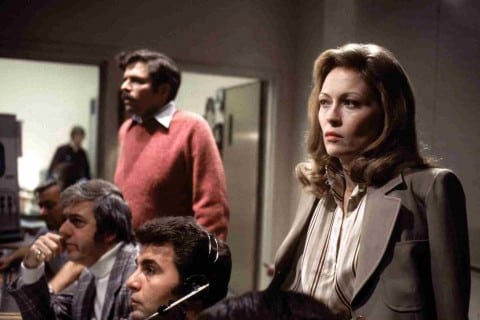
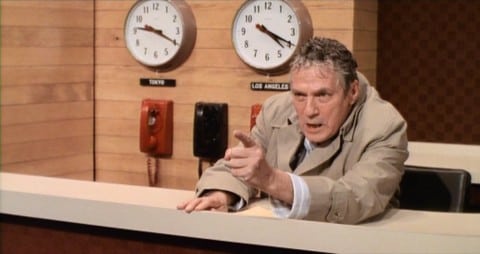



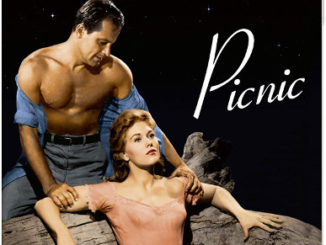
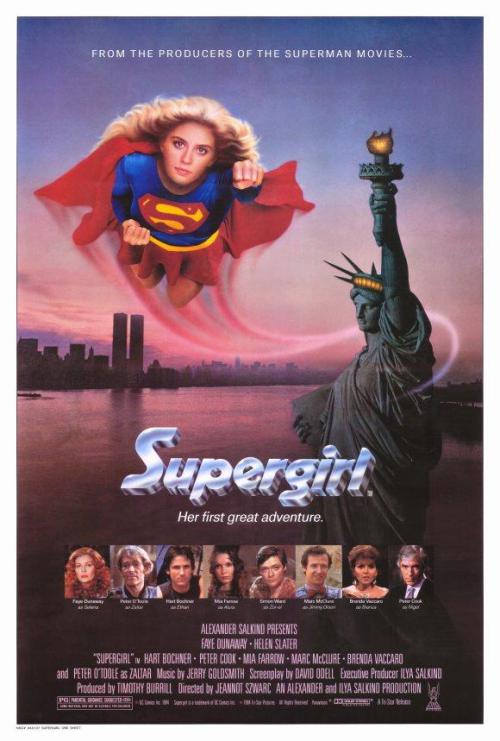
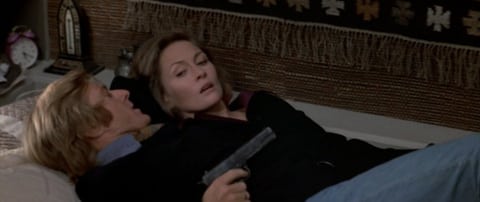
Be the first to comment